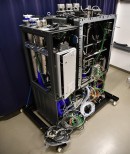One of the most passionate promoters of hydrogen fuel cells for clean maritime transportation has reached a significant milestone.
Two years ago, a clean technology company in Norway was announcing its ambitious plans to build a state-of-the-art facility dedicated to hydrogen fuel cells. On one hand, it would be the country's first large-scale fuel cell production plant. On the other hand, it would also act as a pioneering research and education hub.
TECO 2030 had partnered with UiT (the Arctic University of Norway) which is also located in Narvik. The collaboration would be beneficial for both sides. Experts at the University's Faculty of Engineering Science and Technology would support the future factory with their expertise, while the center's testing facilities would provide unique resources for researchers and students.
Last month, the Norwegian startup officially introduced the FCM400, described as the most compact and energy-dense system primarily for maritime vessels but also for heavy-duty applications. The module starts at 400 kW and can be scaled up in increments of 400 kW to adapt to various applications.
The powerful FCM400 fuel cell is mainly intended to be used for vessels' main or auxiliary engines but can also make a difference at construction sites or at stationary shore power stations.
The first unit was installed into the bench test at Graz, Austria, where TECO's technology development partner is located. Recently, TECO and AVL confirmed the successful running of the first FCM400 system, meaning that the breakthrough technology is now officially validated.
What's next? AVL will continue to produce the first series of units before TECO 2030 can take over production. Its giga factory in Narvik is set to kick off large-scale production by the first half of 2024.
The FCM400 claims to be one of the most powerful hydrogen fuel cells in the world. In addition to the optimal energy efficiency, it promises inherent safety, durability, a fast dynamic-load response, and a practical design in terms of size and weight.
TECO says that a single FCM400 unit could save more than 9,000 tons of CO2 compared to a diesel generator. In terms of production, this is only the beginning. The clean-tech startup is aiming to drastically ramp up its capacity by the end of this decade. The ultimate goal is to produce up to 4,000 units per year by 2030.
TECO 2030 is also supporting green maritime transportation through another innovative concept. It's a zero-emission, floating power barge that could help charge ships while at anchor in places where the onshore grid is insufficient.
It also worked with Shell Shipping and Maritime and with DNV on the Hy-Ekotank project – the conversion of a conventional tanker to hydrogen-electric propulsion using TECO 2030's powerful fuel cell solution.
TECO 2030 had partnered with UiT (the Arctic University of Norway) which is also located in Narvik. The collaboration would be beneficial for both sides. Experts at the University's Faculty of Engineering Science and Technology would support the future factory with their expertise, while the center's testing facilities would provide unique resources for researchers and students.
Last month, the Norwegian startup officially introduced the FCM400, described as the most compact and energy-dense system primarily for maritime vessels but also for heavy-duty applications. The module starts at 400 kW and can be scaled up in increments of 400 kW to adapt to various applications.
The powerful FCM400 fuel cell is mainly intended to be used for vessels' main or auxiliary engines but can also make a difference at construction sites or at stationary shore power stations.
The first unit was installed into the bench test at Graz, Austria, where TECO's technology development partner is located. Recently, TECO and AVL confirmed the successful running of the first FCM400 system, meaning that the breakthrough technology is now officially validated.
What's next? AVL will continue to produce the first series of units before TECO 2030 can take over production. Its giga factory in Narvik is set to kick off large-scale production by the first half of 2024.
The FCM400 claims to be one of the most powerful hydrogen fuel cells in the world. In addition to the optimal energy efficiency, it promises inherent safety, durability, a fast dynamic-load response, and a practical design in terms of size and weight.
TECO says that a single FCM400 unit could save more than 9,000 tons of CO2 compared to a diesel generator. In terms of production, this is only the beginning. The clean-tech startup is aiming to drastically ramp up its capacity by the end of this decade. The ultimate goal is to produce up to 4,000 units per year by 2030.
TECO 2030 is also supporting green maritime transportation through another innovative concept. It's a zero-emission, floating power barge that could help charge ships while at anchor in places where the onshore grid is insufficient.
It also worked with Shell Shipping and Maritime and with DNV on the Hy-Ekotank project – the conversion of a conventional tanker to hydrogen-electric propulsion using TECO 2030's powerful fuel cell solution.









